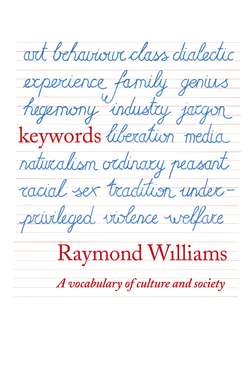Читать книгу Keywords: A Vocabulary of Culture and Society - Raymond Williams - Страница 31
COMMUNISM
ОглавлениеCommunism and communist emerged, as words, in mC19. Their best-known origins, on a European scale, are the Communist Manifesto of Marx and Engels in 1848 and the associated Communist League. But the word had been in use for some time before this. The London Communist Propaganda Society was founded in 1841, by Goodwyn Barmby, and there is an evident connection in this use with communion: ‘the Communist gives (the Communion Table) a higher signification, by holding it as a type of that holy millennial communitive life’. Given the affinities and overlaps of the words deriving from COMMON (q.v.), this range is understandable, and certain connections were deliberately made by Christian utopian socialists. The overlap with secular and republican terminology, basically derived from the French Revolution, is also evident. Barmby claimed that he ‘first pronounced the name of Communism which has since … acquired that world-wide reputation’. This had been in 1840, but significantly ‘in conversation with some of the most advanced minds of the French metropolis’ and in particular ‘in the company of some disciples of Babeoeuf (sic) then called Equalitarians’. Communiste is recorded in a use by Cabet, also in 1840, and communisme and communism (in English also communionism) followed quickly in the same decade. In France and Germany, but not in England, communist became a harder word than SOCIALIST (q.v.). Engels later explained that he and Marx could not have called the Communist Manifesto ‘a Socialist manifesto’, because one was a working-class, the other a middle-class movement; ‘socialism was, on the continent at least, respectable; Communism was the very opposite’. The modern distinction between communist and socialist is often read back to this period, but this is misleading. It is not only that socialism and socialist were more widely used, in Marxist as in other parties, but that communist was still quite widely understood, in English, in association with community and thus with experiments in common property. In English, in the 1880s, socialism was almost certainly the harder word, since it was unambiguously linked, for all its varying tendencies, to reorganization of the society as a whole. Communist was used in a modern sense after the example of the Paris Commune of 1870, but significantly was challenged by some as inaccurate; the real word for that was communard. William Morris in the 1890s expressed his opposition to Fabian Socialism in the explicit terms of Communism and Communist.
Yet the predominant general term was still socialism until the Russian Revolution. In 1918 the Russian Social-Democratic Labour Party was changed in name, by its now dominant Bolshevik section, to the All-Russian Communist Party (Bolsheviks), and nearly all modern usage follows from this. The renaming reached back to the distinction felt by Marx and Engels, and to the Paris Commune, but it was an act of historical reconstitution of the word, rather than of steady continuity. Within this tradition communism was now a higher stage beyond socialism, through which, however, it must pass. But this has had less effect on general meanings than the distinction which followed 1918 (though with many earlier substantial if not nominal precedents) between REVOLUTIONARY and DEMOCRATIC SOCIALISTS (qq.v.). Subsequent splits in the communist movement have produced further variations, though communist is most often used of parties linked to Soviet definitions, and variants of revolutionary and Marxist-Leninist have been common to describe alternative or dissident communist parties.
One particularly difficult use, in this complex and intensely controversial history, is that of Marxist. Virtually all the revolutionary socialist parties and groups, including the Communist Parties, claim to be Marxist, though in controversy they often deny this title to other competing parties of the same general kind. From outside the socialist movement, marxist has also been widely used; partly as a catch-all description of the varying revolutionary socialist and communist parties and groups; partly as a way of describing specifically theoretical and intellectual work and tendencies, often without political or immediately political implications. (In this latter use marxist is often an internal or external euphemism for communist or revolutionary socialist, though the marxist principle of the union of theory and practice gives the frequency of its contemporary use some significance.)
See SOCIALISM
